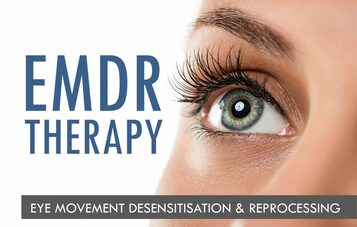EMDR
EMDR helps to process traumatic events and memories that are stored in the raw part of the memory, called the subconscious mind. When they are unprocessed it is like reliving the trauma over and over again every time there is a trigger with the same intensity of feeling like it is taking place in the present moment. You could be triggered by smells, sights, sounds, thoughts and feelings.
Often victims of abuse find that they suffer from reoccurring flashbacks, nightmares, panic attacks, insomnia and not being able to move forward in life, in some cases they will feel like this many years after until they access therapy to help process the memories.
While it isn't possible to erase these memories, the process of Eye Movement Desensitisation Reprocessing (EMDR) can alter the way these traumatic memories impact you, making them easier to manage and causing you less distress.
What is EMDR?
Eye Movement Desensitisation Reprocessing (EMDR), is a form of psychotherapy developed in the 1980s by American psychologist Francine Shapiro.
With certain eye movements, called rapid eye movements this reduces the negative emotions associated with traumatic memories.
The therapist will ask you to make a list of memories that need processing and then will ask you to follow their fingers from side to side while focusing on the trauma. This helps to process the memories. Your therapist will also ask you to have a positive image/ memory that you can focus on.
The process of eye movements is repeated for every trigger until there is a reduction in the trauma. You may need several sessions depending on the trauma and how many there are.
Reported benefits of EMDR include:
Things to consider after every session:
Not suitable for anyone that has:
We have worked with many clients from around the world and they have reported a shift in their emotions.
Limited weekend appointments are available. Please enquire for rate and availability. These will differ to the weekday appointments.
Often victims of abuse find that they suffer from reoccurring flashbacks, nightmares, panic attacks, insomnia and not being able to move forward in life, in some cases they will feel like this many years after until they access therapy to help process the memories.
While it isn't possible to erase these memories, the process of Eye Movement Desensitisation Reprocessing (EMDR) can alter the way these traumatic memories impact you, making them easier to manage and causing you less distress.
What is EMDR?
Eye Movement Desensitisation Reprocessing (EMDR), is a form of psychotherapy developed in the 1980s by American psychologist Francine Shapiro.
With certain eye movements, called rapid eye movements this reduces the negative emotions associated with traumatic memories.
The therapist will ask you to make a list of memories that need processing and then will ask you to follow their fingers from side to side while focusing on the trauma. This helps to process the memories. Your therapist will also ask you to have a positive image/ memory that you can focus on.
The process of eye movements is repeated for every trigger until there is a reduction in the trauma. You may need several sessions depending on the trauma and how many there are.
Reported benefits of EMDR include:
- A reduction in re-experiencing traumatic memories.
- Feeling more able to cope with and manage traumatic memories without needing to avoid potential triggers.
- Feeling more able to enjoy pleasurable activities and relationships.
- Reduced feelings of stress, anxiety, irritation and anger.
- You’re able to go about your daily business without feeling fearful and prone to panic.
- Reduced feelings of isolation, hopelessness and depression.
- A boost in self-confidence and self-esteem.
Things to consider after every session:
- After your session of EMDR your mind will continue to process memories. It is important that you allow yourself time to relax after the session so that you can carry on processing the memories.
- You may become drained and emotional. This is normal as your brain has unlocked memories that have been hidden away to the surface so that they can be processed in a healthy way. These feelings will get better after every session.
- Some have reported to have recovered hidden memories that were forgotten to the surface, thus new emotions required processing.
- You may feel nauseous and want to stay in bed. This is normal and will pass.
- You may find that you process more in between sessions.
- You may find that you see things from a different perspective.
- You may find that you have vivid dreams.
- After every session your mind will begin to feel more and more energised.
Not suitable for anyone that has:
- Eye conditions
- Brain disorders
- Current psychotic illnesses
- low motivation levels for therapy
We have worked with many clients from around the world and they have reported a shift in their emotions.
Limited weekend appointments are available. Please enquire for rate and availability. These will differ to the weekday appointments.
|
EMDR Therapy
60 min £65 (approx. $75-$80 USD)
Taken at the time of booking If you like to access our EMDR therapy, reach out to us by completing the registration form.
|
|
JOIN OUR MAILING LIST!
|
Narcissistic Abuse Leaves You Feeling Lost, Crazy And Alone, We Can Help You To Put Things Into Perspective.
Email: [email protected]
TERMS & CONDITIONS
© Copyright 2018, Narcissistic Abuse Trauma Clinic, All rights reserved. |


